 Petzlover
Petzlover Turkish Angora is originated from Turkey but Ussuri is originated from Russia. Both Turkish Angora and Ussuri are of same weight. Both Turkish Angora and Ussuri has almost same life span. Both Turkish Angora and Ussuri has same litter size. Turkish Angora requires Moderate Maintenance. But Ussuri requires Low Maintenance
Turkish Angora is originated from Turkey but Ussuri is originated from Russia. Both Turkish Angora and Ussuri are of same weight. Both Turkish Angora and Ussuri has almost same life span. Both Turkish Angora and Ussuri has same litter size. Turkish Angora requires Moderate Maintenance. But Ussuri requires Low Maintenance
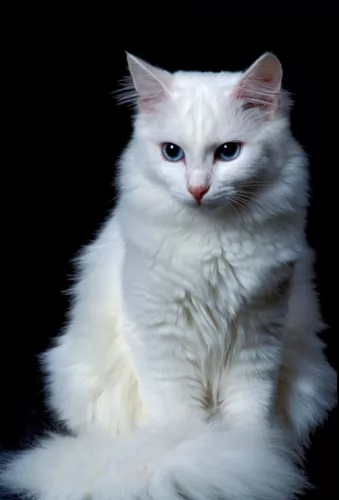 The Turkish Angora is a very old breed that naturally developed. It is thought that the breed developed in Turkey in the Ankara region formerly known as Angora.
The Turkish Angora is a very old breed that naturally developed. It is thought that the breed developed in Turkey in the Ankara region formerly known as Angora.
There are records that indicate that the Turkish Angora made an appearance in the UK as early as the 14th century already. Also, the beautiful longhaired cat was also introduced to the United States.
A breeding program was started for these cats in the early 20th century and it was then taken to Canada in 1963 and accepted as a championship breed.
While white was the only acceptable color at first, they now come in many different colors.
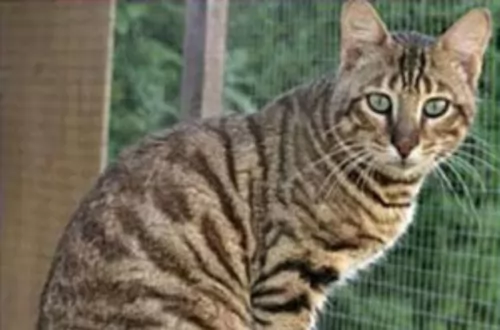 Not much is known about the Ussuri cat but it does seem to be a rare natural cat breed. The cat originates from Russia but is rare even in that country.
Not much is known about the Ussuri cat but it does seem to be a rare natural cat breed. The cat originates from Russia but is rare even in that country.
A breed standard for this cat was published in the 1990s, but nothing has been heard since and its breed status isn't clear. It does seem that the Ussuri's numbers are dwindling due to interbreeding with local domestic cats. Also, the cat doesn't have a breeding program and it is expected that the cat will just quietly disappear.
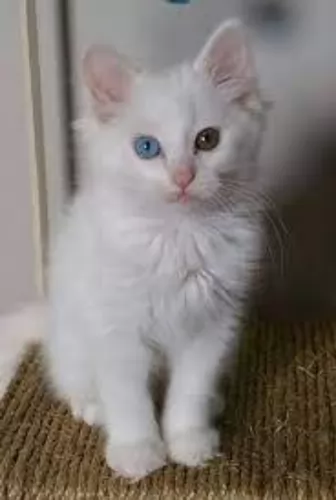 This is a medium-sized, muscular cat that can weigh between 3 and 6kg. It is a long-haired cat and the single coat has no undercoat.
This is a medium-sized, muscular cat that can weigh between 3 and 6kg. It is a long-haired cat and the single coat has no undercoat.
While the Turkish Angora is essentially white, its coat can come in a number of other colors.
The cat’s body if firm and fairly long, the legs are long with the hind legs being longer than the front legs, The tail is long and plumed, the head has large fairly pointed ears that can have tufts of fur. The eyes are large and almond-shaped and slant somewhat upwards. The color of the eyes can be blue, green, gold, amber.
This is a very active, athletic cat and he likes nothing more than to leap up on to high perches to survey his surroundings. They are intelligent, affectionate cats and they seem to gravitate towards one special human family member.
The cat is also protective of his human family. If any family member wants to stroke and pet them, they are absolutely delighted, just lapping up the attention.
They are smart enough to learn a few tricks too. They aren’t vocal cats but are sweet and quiet as well as being affectionate, making them perfect companions.
They don’t do well with changes, and a sudden change in his lifestyle can be upsetting for him.
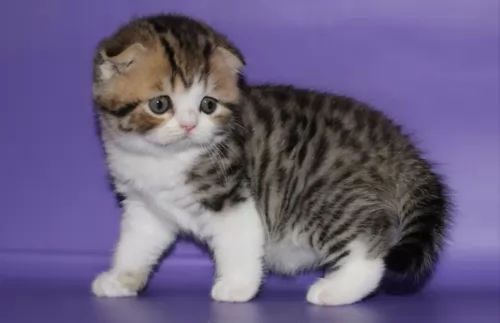 The Ussuri cat can be described as a medium-sized cat that weighs between 3 and 6kg.
The ears often have those tufts, similar to that of a lynx. The body of the Ussuri cat is muscular. The neck is firm, the legs medium length and muscular with rounded paws. The tail has a rounded tip. The coat is short and glossy and there is a thick undercoat.
It has a mix of spots with lines around the face.There are also line on the legs and the tail is ringed. It definitely lives up to looking like a wild cat.
The Ussuri cat can be described as a medium-sized cat that weighs between 3 and 6kg.
The ears often have those tufts, similar to that of a lynx. The body of the Ussuri cat is muscular. The neck is firm, the legs medium length and muscular with rounded paws. The tail has a rounded tip. The coat is short and glossy and there is a thick undercoat.
It has a mix of spots with lines around the face.There are also line on the legs and the tail is ringed. It definitely lives up to looking like a wild cat.
The Ussuri has a wild heritage, and domesticated, they are smart and intelligent. Of course, being on the wild side, they like to hunt and will present you with mice, rats, and birds. They are quite capable of forming strong bonds with their human owners, and tend to gravitate particularly to one member of the family.
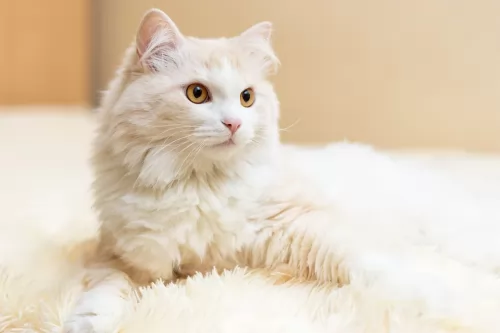 Beautiful to look at, this cat has got all the characteristics that make him a wonderful pet. He is playful well into adulthood and will love an assortment of stimulating toys to be amused by.
Beautiful to look at, this cat has got all the characteristics that make him a wonderful pet. He is playful well into adulthood and will love an assortment of stimulating toys to be amused by.
He is a sociable breed and doesn’t enjoy being left alone for hours. It would be far better to have another feline friend to keep him company.
Active and entertaining, you’ll be amused by your Turkish Angora and be so glad that you made the decision to bring such a charming creature into your home and heart.
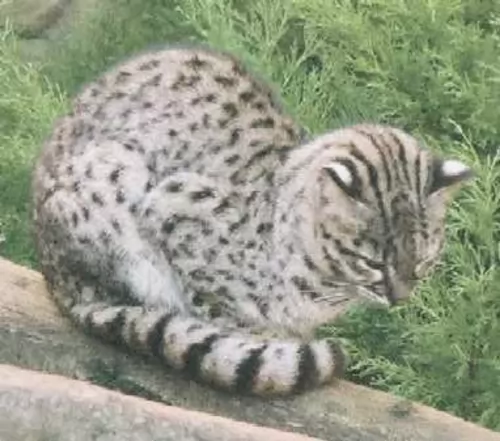 Ussuri Cats are very smart cats and they are able to adapt fairly quickly to their surroundings. Think twice before you invest in a Ussuri as they have different needs to your regular domestic cat.
These are cats that won't slot easily into indoor life and that is why you need to think carefully before you bring such a cat home as a pet.
While they can be affectionate to their human family, they are restless cats, wanting to get away to that wild life they once knew.
Ussuri Cats are very smart cats and they are able to adapt fairly quickly to their surroundings. Think twice before you invest in a Ussuri as they have different needs to your regular domestic cat.
These are cats that won't slot easily into indoor life and that is why you need to think carefully before you bring such a cat home as a pet.
While they can be affectionate to their human family, they are restless cats, wanting to get away to that wild life they once knew.
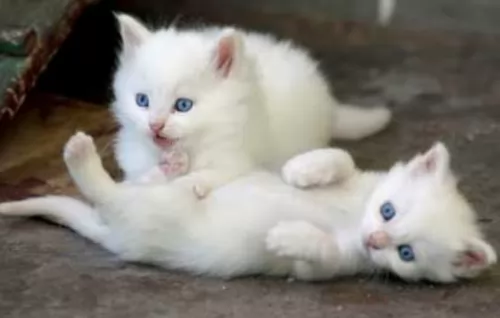 Turkish Angoras are generally healthy, but white cats with blue eyes can be prone to deafness. It is the W gene that is responsible for the white coat and blue eyes. Unfortunately, the presence of a blue eye can indicate deafness in the cat. But there are these cats that have 2 blue eyes and they have normal hearing.
Turkish Angoras are generally healthy, but white cats with blue eyes can be prone to deafness. It is the W gene that is responsible for the white coat and blue eyes. Unfortunately, the presence of a blue eye can indicate deafness in the cat. But there are these cats that have 2 blue eyes and they have normal hearing.
Another problem that has been seen in this beautiful cat breed is Ataxia which is a deadly neuromuscular disorder.
The most common sign of ataxia is an abnormal way of walking and the cat is actually unsteady on his feet. Sometimes the feet can even drag on the ground. Thankfully, screening has reduced the incidence of the disease.
Also, watch out for hypertrophic cardiomyopathy, a kind of heart disease that causes the heart muscle to enlarge.
Just remember that with a cat, diet can also play a huge role in the health of a cat. Your furry friend needs the right meaty foods with the right balance of nutrients to remain healthy and strong.
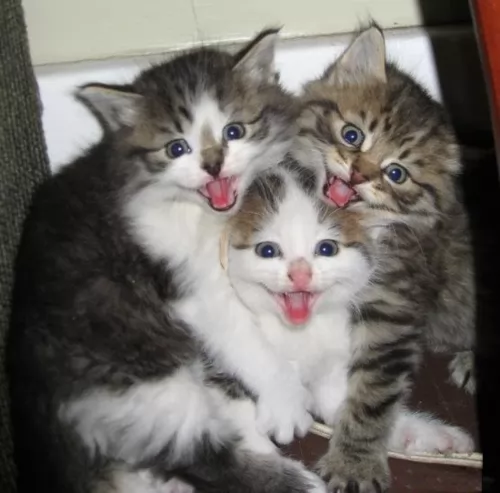 These are strong, robust cats, but even so, for your own peace of mind, a visit to the vet every now and them can be a good thing to make sure everything is aright with your cat.
Healthy they may be, but they can still pick up any one of the many common cat diseases there are.
With a good diet, plenty of exercise and a caring environment, they can reach 16 years of age or older.
These are strong, robust cats, but even so, for your own peace of mind, a visit to the vet every now and them can be a good thing to make sure everything is aright with your cat.
Healthy they may be, but they can still pick up any one of the many common cat diseases there are.
With a good diet, plenty of exercise and a caring environment, they can reach 16 years of age or older.
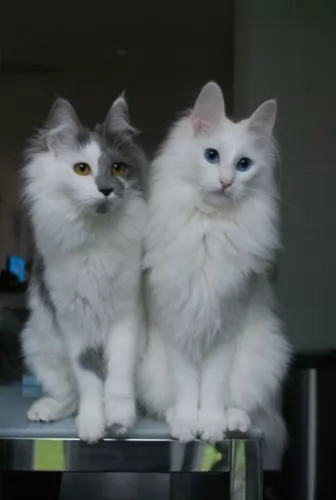 The Turkish Angora has a single coat and the lack of an undercoat makes it easy to brush him and keep the coat soft and silky. Also, the coat is only fully developed when the cat is about 2 years old.
The Turkish Angora has a single coat and the lack of an undercoat makes it easy to brush him and keep the coat soft and silky. Also, the coat is only fully developed when the cat is about 2 years old.
Check the inside of the ears. You may not want to clean them out yourself as you have to be very careful not to damage the ears. The vet and cat groomers can help you with this.
Keep your Turkish Angora’s litter box spotlessly clean. Cats are very particular about the cleanliness of their litter box and the feces will need to be removed every single day.
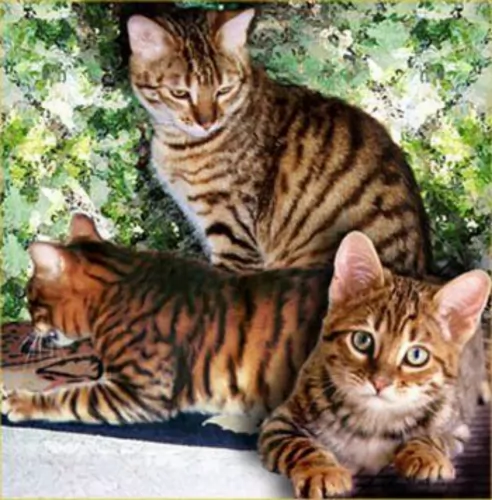 The short coat of Ussuri cats is glossy and close-lying, and a brush once a week will be fine for this cat.
Provide your pet with an outside enclosure. These are cats with a wild side, and to ensure you don't get frustrated with him, an enclosure with climbing equipment will be a good idea.
Ensure the cat gets plenty of exercise. You will need to invest in interactive toys that encourage this intelligent cat to think things out.
Only the very highest quality meat-diet will be good enough for this cat. Ensure he has a constant supply of fresh cool water.
In his outside enclosure, you can include a paddling pool, and in the wilds, cats like to paw at water and wade in.
Provide your pet with a comfortable sleeping area.
The short coat of Ussuri cats is glossy and close-lying, and a brush once a week will be fine for this cat.
Provide your pet with an outside enclosure. These are cats with a wild side, and to ensure you don't get frustrated with him, an enclosure with climbing equipment will be a good idea.
Ensure the cat gets plenty of exercise. You will need to invest in interactive toys that encourage this intelligent cat to think things out.
Only the very highest quality meat-diet will be good enough for this cat. Ensure he has a constant supply of fresh cool water.
In his outside enclosure, you can include a paddling pool, and in the wilds, cats like to paw at water and wade in.
Provide your pet with a comfortable sleeping area.